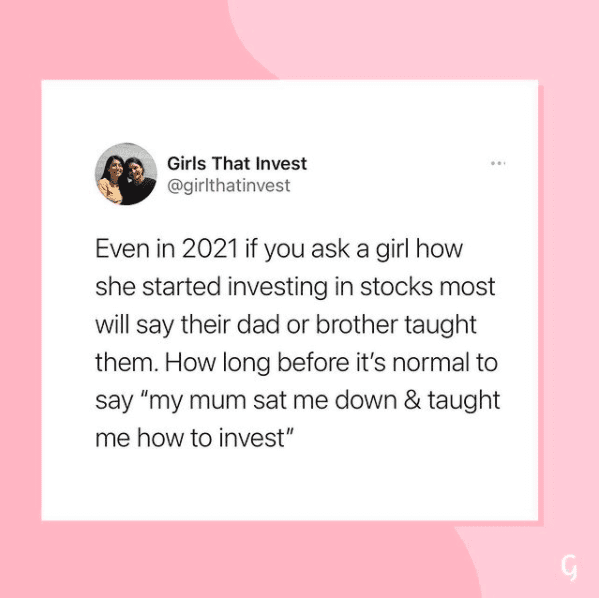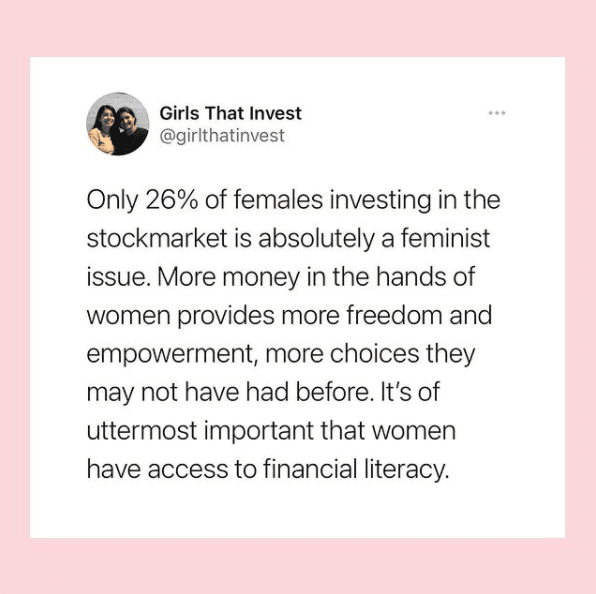If you’re anything like us, you’ll have a growing interest in investing – but have absolutely no idea where to start! For some reason, there’s a thought abound that women and money don’t always go together and we’re just not here for that in 2021 – so we went to the experts, the wonderful Sim and Sonya from Girls That Invest to break down the top three myths that hold us back from our investing potential, and their tips for getting started!
Money has never been a subject we like to talk about as Kiwis, and even less so as women. In fact, studies have shown women would rather talk about their funeral than their finances (seriously!) The world of investing still comes across as daunting to the average Kiwi woman – Sharesies shows that only 14% of women invest in shares, compared to 25% of men.
Having the confidence and motivation to invest is also lower for women— roughly half that of men. So we – Sim and Sonya, two millennial girls from Auckland – have decided to challenge this narrative. With more than 20,000 Instagram followers and featured as a Top 5 Apple Business podcast, our Girls That Invest platform run by the two besties has taken off – and today we’re here to talk about all things investing!
Before we begin, what is investing? It’s the simple concept of putting your money in a financial vehicle, whether that be real estate, shares in the stock market, or even high-end commodities because you have the expectation that the value of that asset will increase over time and give you a profit.
While women already suffer from the wage gap, more and more of us are beginning to suffer from the gender wealth gap, leading to a vicious cycle. This leads to the questions: ‘Why aren’t more of us investing?’ and ‘What myths are holding us back from reaching our own version of financial freedom?’ Here are the three biggest reasons holding millennial women back from investing, and why they need to be busted.
1. MYTH: You need to be very clever to invest
62% of our Girls That Invest community members in our Facebook group said that “not understanding investing” was their biggest barrier in starting their investing journey. Studies show that women tend to want to understand things completely before diving into them, whereas men are more likely to give it a go and learn along the way. There is no surprise here, the world of finance is full of obscure terms that are quite intimidating if you’re not in that field. This can sometimes feel intentional. For the average person, it’s about understanding the basics. You might find yourself putting a bit of time into research and reading at the start. I mean, I’d argue that this is the case for anything in life!
You don’t need a degree in finances to invest for yourself, research shows the interesting thinker about being a good investor has not been about having a good gut instinct or knowing what’s going on in particular industries – being disciplined is the most important trait that matters to building wealth long term. What’s more successful is having a plan and sticking to it regardless of what’s going on in the world.





2. MYTH: That investing is like gambling or that you can lose all your money
This myth has been a huge barrier to why more young people aren’t investing – when we asked our community, it was the second biggest reason holding people back, and yet it’s just not true. Priya Malani, an investment company CEO, found younger investors think you pick some stocks, cross your fingers, and hope you don’t lose all your money,
The key difference is that when you’re gambling you are taking on a chance or a bet and there is nothing more you can do about it. Whereas investing is informed decisions-based research that you have done about a company or a fund – you understand their pros and cons, you’re taking into account your risk appetite, and you’re not basing your choices off speculation (for example, you’re not saying “I feel like Tesla is going to do really well because Elon Musk seems smart so I’m going to dump $500 and hope for the best). No, you are making educated decisions and you know what you’re getting yourself into.
It seems like whenever you bring up the topic of investing among your friends, you’ll always hear someone who had a story about how they know someone who got burned from investing in the stock market, particularly during the 2008 GFC. The only way you actually lose money is by panicking and pulling your money out. If you leave your money there, the market will eventually recover, and if you were invested in risky stocks where the value dropped a lot, that stock also is going to make the biggest gains when the market does recover.
If you ask financial advisors, they tell you that they work with some very intelligent, very successful, and grounded professionals, but yet in the moment these people can’t separate their emotions with their decisions – they freak out because they worry it was going to drop more, but in doing that you are cementing your losses. If you ever do hear someone talking about how they lost all their money, it’s worth looking into how that occurred. Were they investing in the things that aligned with their values – for example, did their portfolio align with their values and their risk appetite? The most successful investors all have one trait in common and that’s their ability to put aside their emotions and be disciplined, and just ride out the highs and lows.


3. MYTH: You shouldn’t invest until you’re old and rich
For so many people, putting off any investment decisions until they get a high-paying job seems like a no-brainer. But the fact is, starting in your twenties is the prime time to start your investing journey. Let’s talk about a little thing called compound interest for a minute. Einstein named this the eighteen wonder of the world – so it must be a big deal, right? Compound interest is interest on top of interest and it works in a snowball effect, and then over time, your money is working for you (the DREAM). When you’re young, you’re less likely to have heaps of money to invest compared to someone in their fifties.
However, you do have a lot more time. Time investing can actually be more valuable than money. Time even beats out money—relatively speaking—if you have enough of it.
For example: If a 20 year old invested $10,000, and it grew at 5 percent (a pretty conservative rate, historically), you’d have $70,000 by the time you were 60 years old. The same investment would get you only about $43,000 if you started at 30, and only $26,000 if you started at 40. It doesn’t make sense to wait and invest “once you’re older and are more established” because you’ll miss out on the gains of time. The key point here is, get in there when you’re young and watch your returns build on each other as you age. It’s about time in the market.
The key takeaway is that there are as many false narratives about investing that continue to hold new investors, especially women, back. Starting out your investing journey can be as simple as reading a book, watching a YouTube video or listening to a Girls That Invest podcast – finding a medium that works for you and kick start putting your money to work!
Join our investing group here: https://www.facebook.com/groups/620511298746021
Listen on Apple or Spotify: https://anchor.fm/girls-that-invest

